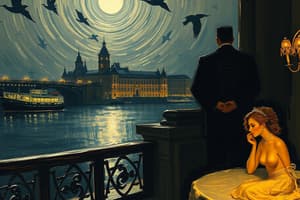Podcast
Questions and Answers
What is the birth name of the character known for his lavish lifestyle?
What is the birth name of the character known for his lavish lifestyle?
- Tom Buchanan
- George Wilson
- James Gatz (correct)
- Meyer Wolfsheim
Which character is described as the 'antagonist' of the story?
Which character is described as the 'antagonist' of the story?
- Nick Carraway
- Myrtle Wilson
- Tom Buchanan (correct)
- Jordan Baker
What societal issue does Daisy Buchanan embody in her character?
What societal issue does Daisy Buchanan embody in her character?
- Political activism
- Rebellion against norms
- Ambition for wealth
- Greed and superficiality (correct)
How does Nick Carraway view himself in relation to honesty?
How does Nick Carraway view himself in relation to honesty?
What does Myrtle Wilson represent within the social context of the story?
What does Myrtle Wilson represent within the social context of the story?
What criticism does Nick Carraway make about Daisy and Tom Buchanan?
What criticism does Nick Carraway make about Daisy and Tom Buchanan?
Which character is considered 'incurably dishonest' by Nick Carraway?
Which character is considered 'incurably dishonest' by Nick Carraway?
What is the occupation of George Wilson?
What is the occupation of George Wilson?
What year was The Great Gatsby published?
What year was The Great Gatsby published?
Who narrates the story in The Great Gatsby?
Who narrates the story in The Great Gatsby?
What is a central theme explored in The Great Gatsby?
What is a central theme explored in The Great Gatsby?
Which symbol is NOT mentioned in The Great Gatsby?
Which symbol is NOT mentioned in The Great Gatsby?
What literary period is Fitzgerald associated with?
What literary period is Fitzgerald associated with?
Which poet is mentioned as influencing Fitzgerald's writing?
Which poet is mentioned as influencing Fitzgerald's writing?
What does Gatsby attempt to impress Daisy with?
What does Gatsby attempt to impress Daisy with?
Which conflict is reflected in the moment when Daisy mentions the nightingale?
Which conflict is reflected in the moment when Daisy mentions the nightingale?
What does Gatsby's outstretched arms towards the green light symbolize?
What does Gatsby's outstretched arms towards the green light symbolize?
How does Fitzgerald depict gender roles in the Roaring Twenties?
How does Fitzgerald depict gender roles in the Roaring Twenties?
What is the significance of the 'valley of ashes' in the narrative?
What is the significance of the 'valley of ashes' in the narrative?
What do the eyes of Doctor T.J. Eckleburg represent?
What do the eyes of Doctor T.J. Eckleburg represent?
What connotations does the color green carry in relation to Gatsby's character?
What connotations does the color green carry in relation to Gatsby's character?
Why does Gatsby describe Daisy's voice as 'full of money'?
Why does Gatsby describe Daisy's voice as 'full of money'?
Which concept does the 'foul dust' in Gatsby's life symbolize?
Which concept does the 'foul dust' in Gatsby's life symbolize?
What literary work is referenced to illustrate the bleakness of the 'valley of ashes'?
What literary work is referenced to illustrate the bleakness of the 'valley of ashes'?
How does Gatsby's wealth reflect his involvement in illicit activities?
How does Gatsby's wealth reflect his involvement in illicit activities?
What does Gatsby's failure to win Daisy back symbolize?
What does Gatsby's failure to win Daisy back symbolize?
What does Fitzgerald suggest about the nature of beauty and decay within the valley of ashes?
What does Fitzgerald suggest about the nature of beauty and decay within the valley of ashes?
What is indicated by the phrase 'transcendent effort' in the context of the valley of ashes?
What is indicated by the phrase 'transcendent effort' in the context of the valley of ashes?
What does the imagery of 'ashes grow like wheat' symbolize in the narrative?
What does the imagery of 'ashes grow like wheat' symbolize in the narrative?
What does the character of Gatsby exemplify in the context of American society?
What does the character of Gatsby exemplify in the context of American society?
How does Gatsby's need to reinvent himself illustrate the themes present in the narrative?
How does Gatsby's need to reinvent himself illustrate the themes present in the narrative?
What literary device does Fitzgerald use to emphasize the dreariness of life in the valley of ashes?
What literary device does Fitzgerald use to emphasize the dreariness of life in the valley of ashes?
What does Tom’s desire to introduce his mistress to Nick imply about his character?
What does Tom’s desire to introduce his mistress to Nick imply about his character?
How does Fitzgerald portray the societal standards for men and women in the 1920s?
How does Fitzgerald portray the societal standards for men and women in the 1920s?
What does Myrtle's description suggest about her social aspirations?
What does Myrtle's description suggest about her social aspirations?
What underlying theme does Fitzgerald depict through the experiences of Myrtle?
What underlying theme does Fitzgerald depict through the experiences of Myrtle?
What does the mention of 'elaborateness of the lie' signify about Tom's behavior?
What does the mention of 'elaborateness of the lie' signify about Tom's behavior?
What does the Madonna-Whore Complex suggest about gender roles during the Flapper Age?
What does the Madonna-Whore Complex suggest about gender roles during the Flapper Age?
How does Tom’s action of breaking Myrtle's nose impact the audience's perception of him?
How does Tom’s action of breaking Myrtle's nose impact the audience's perception of him?
What emotional response does the text evoke towards Myrtle’s character?
What emotional response does the text evoke towards Myrtle’s character?
Flashcards are hidden until you start studying
Study Notes
The Great Gatsby Overview
- Written by F. Scott Fitzgerald in 1925, considered a seminal text of the 20th century.
- Set in the summer of 1922 in New York, composed of 9 chapters, narrated by Nick Carraway, an unreliable narrator.
- The novel follows Nick's memories of Jay Gatsby, a wealthy man obsessed with winning back Daisy Buchanan, a married woman he loves.
- Gatsby throws lavish parties in an attempt to impress Daisy. The story unfolds as Gatsby's dreams are challenged by Daisy's husband, Tom Buchanan.
- Explores themes of the Roaring Twenties, The American Dream, class, and the struggle between the past and future.
- Captures the spirit, excitement, and violence of the "Jazz Age."
- Important symbols include: the green light, Dr. T.J. Eckleburg's eyes, the Valley of Ashes, the East vs. West divide, and Gatsby's mansion.
Literary Influences and the Modernist Period
- Fitzgerald was writing during the Modernist period, a time of rapid technological advancement and societal change.
- Despite this, his poetic writing suggests influence from the Romantic period.
- Some critics believe Fitzgerald was influenced by John Keats, specifically "Ode to a Nightingale," where the speaker is torn between the allure of death and the uncertainty of life.
- Fitzgerald's portrayal of Daisy echoes this theme. When Daisy sees a nightingale, she refers to it as "romantic," suggesting an "enchanted" feeling toward it.
- This moment is interrupted by the "shrill" sound of a telephone, seemingly representing modernity's interruption of nature's beauty.
- Fitzgerald also looked to T.S. Eliot, calling himself a "worshipper" of Eliot's poetry.
Key Characters
- Jay Gatsby: A self-made millionaire through illegal activities during Prohibition. Represents the "new money" of the Jazz Age, a tragic hero and devoted lover.
- Nick Carraway: The unreliable narrator who recounts Gatsby's story, describing himself as "one of the few honest people that [he has] ever known." He is Daisy's cousin and criticizes her and Tom's lifestyle. Represents a romantic critic of 1920s America.
- Daisy Buchanan: Gatsby's love interest, Nick's cousin, and Tom Buchanan's wife. She values material possessions and superficiality. Her loyalty to her unfaithful husband betrays Gatsby's hopes. Represents the lust for money and the corruption of society in the 1920s.
- Jordan Baker: Nick's love interest, but he later criticizes her as "incurably dishonest" for cheating in golf.
- Tom Buchanan: Daisy's husband and the antagonist of the story. He is a wealthy, misogynistic, racist, and violent man representing the "old money" class.
- Myrtle Wilson: Tom's mistress and George Wilson's wife. She desperately desires a better life but faces violence from her husband, indifference from Tom, and a fatal encounter with Gatsby's car. Represents the lower class trapped in poverty and exploitation.
- George Wilson: Myrtle's husband and owner of a garage in the Valley of Ashes. He loves his wife but turns violent after discovering her affair. His grief and anger drive him to instability.
- Meyer Wolfsheim: Gatsby's friend and business partner. He is a gambler involved in organized crime known for fixing the 1919 World Series.
Chapter 2: The Valley of Ashes and Gender Roles
- The "Valley of Ashes" depiction echoes the bleak, materialistic, and consumerist landscape portrayed in T.S. Eliot's "The Waste Land," published in 1922, the same year as The Great Gatsby.
- This bleak "valley" symbolizes the people excluded from the Roaring Twenties' excesses.
- The "ashes" reference the "foul dust" that preyed on Gatsby, referencing his potential involvement in bootlegging.
- The "eyes" of Dr. T.J. Eckleburg looking down on the valley evokes Nietzsche's theory of "the death of God" and reflects the rise of media and advertising power.
- Gatsby's fascination with wealth highlights the shallow nature of both Gatsby himself and those who gossip about him.
- Gatsby's pursuit of the American Dream is corrupted by his need to reinvent himself to escape his past. James Gatz, his birth name, would not have achieved wealth because of his Jewish German heritage.
- Despite his success, he fails in his dream to win Daisy back. Her rejection confirms the corruption of the American Dream and makes her a symbol of it.
Key Quotes & Analysis
-
"This is a valley of ashes—a fantastic farm where ashes grow like wheat into ridges and hills and grotesque gardens; where ashes take the forms of houses and chimneys and rising smoke and, finally, with a transcendent effort, of men who move dimly and already crumbling through the powdery air."
-
Contrasts "wheat" and "gardens", associated with life and nature, with "ashes," representing death. This highlights the destruction of beauty and the spread of immorality in 1920s America.
-
The long list of ash-made objects emphasizes the scope of decay.
-
Repetitive use of "and" (polysyndeton) slows the pace, emphasizing the drudgery of life in the valley.
-
The "transcendent effort" depicts the men's struggle to simply exist, highlighting their crumbling state.
-
"I want you to meet my girl"
-
Tom's bold statement reveals his lack of regard for the consequences of introducing his mistress to Daisy's cousin. This highlights the double standards of the time. Men's mistresses are considered attractive, while women who take lovers face consequences like death (Myrtle) or isolation (Daisy).
-
"She was in the middle thirties, and faintly stout, but she carried her flesh sensuously as some women can [...] looking at him flush in the eye. Then she wet her lips..."
-
Myrtle's seductive description highlights the desperation of lower-class women seeking to transcend their status through romantic relationships. This ultimately results in self-destruction, as shown by Tom's violence towards her and George's jealous rage.
-
Myrtle's submissive nature reflects societal expectations of women, while Tom's behavior exemplifies male dominance.
-
"'You see,' cried Catherine triumphantly. She lowered her voice again. 'It's really his wife that's keeping them apart. She's a Catholic and they don't believe in divorce.' Daisy was not a Catholic, and I was a little shocked at the elaborateness of the lie."
-
Tom's "elaborateness of the lie" highlights his manipulative power and disregard for truth. This exposes his exploitation of the women in his life.
-
Myrtle's obliviousness to her own exploitation further fuels sympathy for her character.
Studying That Suits You
Use AI to generate personalized quizzes and flashcards to suit your learning preferences.




